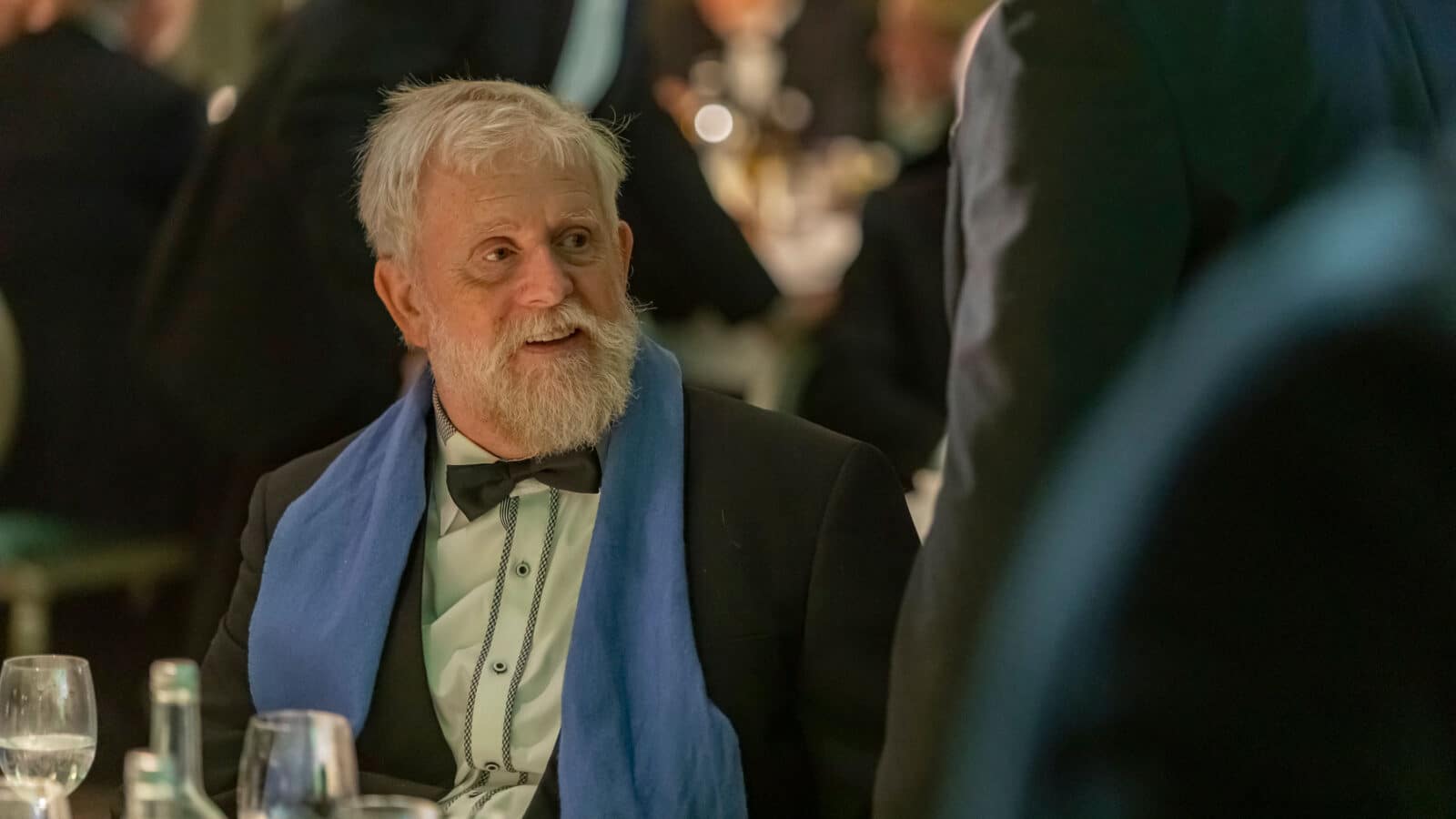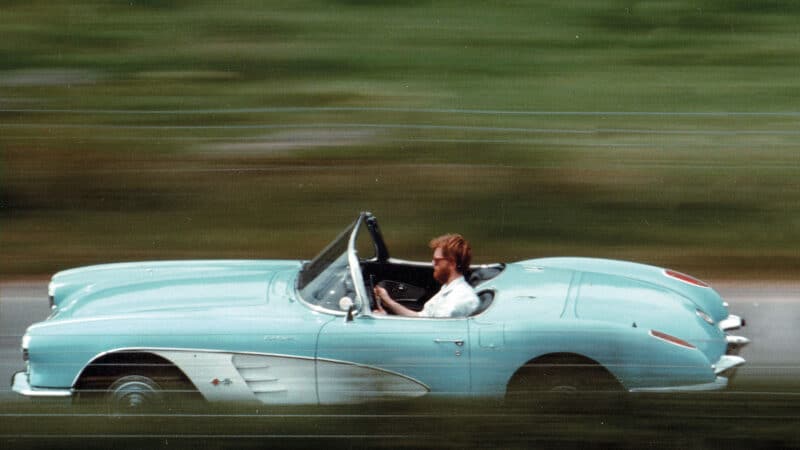In tribute to Gordon Cruickshank

GC among friends at Motor Sport’s 100th anniversary celebration in summer
john bushell
Gordon Cruickshank: 16 July 1955 – 9 December 2024
When asked to write an appreciation of someone’s life, the trick is to look for and hope to find enough in their character and achievements to make them stand out as someone special, a cut above. It’s what you do. Except when the subject is Gordon Cruickshank. For him no looking was ever going to be required; because the fact he was one of most extraordinary people you could ever have the dumb luck to meet was nose-on-face obvious to literally everyone who got to know him.
He worked on this title for 42 years, right up until just days before his death on December 9, aged 69. Alongside Bill Boddy and Denis Jenkinson he’s among the most consequential people ever to work for Motor Sport. In that time editors came and went – even I was one of them for a few years – but Gordon remained the one true constant of the world’s oldest motor sport title, through is 1980s heyday and the dark days of its 1990s decline, to its revival during the 2000s and on to the present day.
And yet it is tempting to focus on how much more even than that he might have gone on to achieve but for one dark day in 1989 when the Mercedes in which he was a passenger left the road, overturned and left him a tetraplegic. But the problem here is that Gordon would hate to dwell upon this not just because he absolutely refused to be defined by his accident, but also because it would risk painting a picture of a man quite understandably inclined to wonder ‘if only’ or, worse, a person prone to self-pity. If that was even an instinct he possessed few, if any, saw it. Just once in the 28 years he was my friend did I get a glimpse, a moment of frustration about how utterly avoidable and unnecessary had been the accident that changed his life. And even that manifested as pure anger, and if you knew Gordon, the very idea of him getting angry might seem somewhat implausible.
He woke up in Stoke Mandeville, looked straight in the eye an existence few of us could even contemplate, and simply got on with it. By strapping a pencil to his hand (his fingers no longer worked) he was able to stab away at a keyboard and thereby keep a diary. A diary that was turned into a Sony Award-winning BBC Radio 4 play starring Peter Capaldi as Gordon, which might give some idea of the calibre of writer we’re dealing with here.
Bored and determined to make as much of his future as his disability would allow, he borrowed an anatomy book from his doctors and turned his engineering brain to discovering how hands were designed. It took him no time at all to realise it was all just mechanical components, some of which still worked, most of which did not. It took him rather longer to design his own operation to recover as much function as humanly possible before pitching it to the surgeons who, suitably agog, realised their patient might just be on to something. I believe it became standard NHS procedure for patients with Gordon’s level of spinal injury shortly thereafter.

Gordon Cruickshank, in his element, behind the wheel of a ’58 Corvette.
Crucially the surgery gave him the ability to flex his hands and afforded some mobility in his thumb. It may not seem like much to you or me, but to Gordon it was everything: he could hold a knife and fork, lift a glass so long as it had a thin stem and thereby feed and water himself. Although he would need access to care 24 hours per day for the rest of his life, it returned a transformative degree of independence and dignity. And one more thing: because he could now hold a handle on a steering wheel, it meant he could drive.
I don’t know how many tetraplegics in the UK hold driving licences and how many of them do regularity rallies in classic cars but now Gordon has passed on, I expect the answer is none. I was driven by him on innumerable occasions and he drove just as he did (I am told) before the accident: fast, smooth, decisive with his brain always yards ahead of the vehicle. I never felt safer in a car.
He adored cars in general, Alfas in particular and drove a 164, Jaguar XF and a Giulia, with his 3.4-litre Mk2 Jaguar kept for competition use and his BMW 635CSI for recreation. Often he’d come to see us for lunch, a 270-mile round-trip from his home in Wimbledon Village and usually without a carer, which absolutely terrified us. If he’d broken down somewhere with no mobile signal he’d not even be able to get out of the car, let alone call for help. Gordon, by contrast, was entirely sanguine about it and would never dream of letting such a merely potential inconvenience spoil his fun.
But Gordon was so much more than simply the most courageous man I’ll ever get to call my friend. His writing was all journalism should be: simple, flawless and endlessly entertaining. Editing his copy was very little different to sitting down with a really good book; you’d just read his story, maybe put a headline and sub-head on it, then pass it for press. The thought it might be grammatically incorrect or factually inaccurate was laughable.
He was also incredibly funny, a gift I fear seen only by his closest friends or those who worked with him day in, day out. His stories were always told deadpan, as if he were the only person in the room who didn’t see the humour in them.
He told tales of the old days of Motor Sport in the late 1980s and early 1990s where the news desk was only allowed to make telephone calls at times that coincided with the cheap-rate tariff; and how the stationery lady would only issue reporters with a fresh Bic biro once evidence of its spent predecessor had been produced. He kept in his desk a list of all the fictional names he’d read which had really amused him, never more so than when I was able to reveal to him that one such name – Sappho Clissitt – was not only a real person, but a literary agent and a friend of mine.
And for all the scientific precision of his brain, his love was for the arts, be it literature, paintings or music. Every summer he’d hold a garden party where the great and the good would gather: I remember one year finding common cause with art critic Brian Sewell as we both fulminated about freelance journalist word rates. He also loved having people over, loved going to the cinema and theatre with them, loved travelling, loved talking to my children and most of all loved life despite the dreadful blow it had dealt him. And, as previously mentioned, he never, ever complained.
There is so much I’ll miss now Gordon is no longer with us. His knowledge, wit and warmth; his gentleness, kindness and consideration for others. But there is something to which his passing will make no difference at all, and that is what, thanks to Gordon, I have learned. He taught me to be more patient, and have more grace about matters beyond my control. Most of all he showed me the true meaning of fortitude. With many others, I will miss him more than I can say. Andrew Frankel
